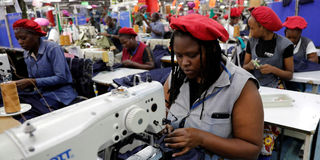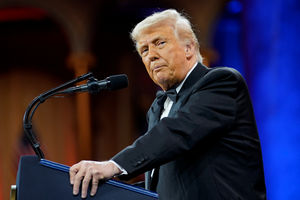
Kenyan workers prepare clothes for export at the United Aryan Export Processing Zone (EPZ) factory, operating under the US African Growth and Opportunity Act (Agoa), in Ruaraka, Nairobi, in October 26, 2023.
Farmers and workers in the textile sector are most exposed as a 10 percent tax by the US on Kenyan goods kicks in, disrupting an industry with about 180,000 jobs.
The 10 percent tariff announced by US President Donald Trump on Wednesday last week has taken effect, even as manufacturers and exporters struggled to explore ways to tackle disruptions.
Goods exported by Kenya will be taxed at the rate of 10 percent in the US, which will make them more expensive than they have been, hence US consumers could stop buying them and switch to alternative cheaper products.

US President Donald Trump delivers remarks during a Business Roundtable event in Washington on March 11, 2025.
The tax will mainly affect exports of textile products, tea, coffee, fruits and flowers, which have previously enjoyed tax-free entry into the US under the African Growth and Opportunity Act (Agoa) framework.
“The tariffs imposed by the US are kicking in from today. It takes 30 days for export cargo to dock in the US after issuance of an export entry,” a manufacturer told the Nation on Wednesday.
Overall, Kenya exported goods worth Sh95 billion ($737.3 million) to the US last year, which was a 17.5 percent drop from $894 million exports in 2023.
Kenya exports about 6,000 products to the US under the Agoa framework that supported Sh250.9 billion exports between 2019 and 2023.
At least 39 factories operating in export processing zones (EPZs) in the country and employing 82,771 persons directly export to the US under Agoa, the state department for trade says.
The Kenya Association of Manufacturers (KAM) adds that on top of the direct jobs captured by the government, the sector provides 100,000 indirect jobs across supply chains.
“If tariffs override Agoa benefits, it could reduce Kenya's trade advantage. Changes in Agoa's future, including its potential renewal or cancellation, further complicate the landscape,” Trade Principal Secretary (PS) Juma Mukhwana said.

Kenya National Qualifications Authority Director-General Juma Mukhwana
The PS said Kenya’s textiles and apparel exports to the US could face reduced demand due to the tariff, as agricultural products such as coffee, nuts and flowers also become less competitive.
The government has been in a campaign to boost cotton production as a way to cut import of fabric used by factories exporting to the US, with a plan to double land under cotton farming from 104,000 acres last year.
“Tariff uncertainties may make the Kenyan market less attractive for US investors and EPZs, many of which rely on access to the US market could suffer,” Dr Mukhwana said.
KAM notes that the tax will hit the apparels sector the most, since it constituted 72 percent (Sh68.7 billion) of Kenya’s exports to the US last year.
The manufacturers’ lobby said the tariff will reduce Kenya’s price competitiveness in the US and affect existing contracts that have been based on duty-free US market access under Agoa.
“Kenya’s exports to the USA, previously duty-free under Agoa, will now be subject to additional costs, reducing their market competitiveness. Contracts currently based on zero (0 percent) AGOA preferential treatment will be affected, potentially forcing Kenyan manufacturers to absorb extra costs,” KAM CEO Tobias Alando said.
The manufacturers’ lobby also noted that the tariff risks widening the Kenya’s trade deficit with the US, which was at Sh5.8 billion last year.
Extend or review
The lobby has urged government to push for either extension of Agoa which expires in September or a review of the 10 percent tariff “to maintain Kenya’s export price competitiveness in the USA market.”
The Kenya Chamber of Commerce and Industry (KNCCI) last week said the tariff would affect Kenya’s trade imbalance, terming it a wake-up call for Kenya to re-look at its economic structure.
“This development gives Kenya and Africa a perfect opportunity to build stronger and resilient brands including local capacity on information technology products, digital technology, equipment and machinery to spur industrialization,” said KNCCI president Erick Rutto.
In the tea sector, however, exporters say the tariff could be a blessing in disguise, since Kenya’s competitors in exporting tea to the US, Sri Lanka, China and India, were hit with higher tariffs.
“Based on the tariffs that were announced, Kenya has competitive advantage over our competitors such as Sri Lanka which was slapped with a 44 percent tariff, China (61 percent) and India (27 percent). This provides an opportunity for Kenya to grow its US tea market share, essentially by the government creating a conducive environment for more production of value-added tea which is what the US imports,” said George Omuga, East African Tea Trade Association (EATTA) MD.
PS Mukhwana said among strategies Kenya is exploring is a push for the Kenya-US Strategic Trade and Investment Partnership (STIP) to replace Agoa and seeking exemptions or favorable terms under the new tariff regime.
Kenya is also strengthening ties with China, India, the UAE and other African countries through the African Continental Free Trade Area (AfCFTA) to access a broader market while encouraging local production of goods previously imported from the, the PS said.
“These changes also need to allow us to relook at our rules for importing mitumba. Importing mitumba has hampered growth of our local textile industry,” PS Mukhwana said.
Kenya’s top imports from the US include petroleum gas, wheat and plastic products. The US is also one of Kenya’s main sources of second-hand clothes (Mitumba).
The government, however, hopes that higher tariffs imposed on countries competing with Kenya to export similar goods to the US will offer Kenya a competitive price advantage.










